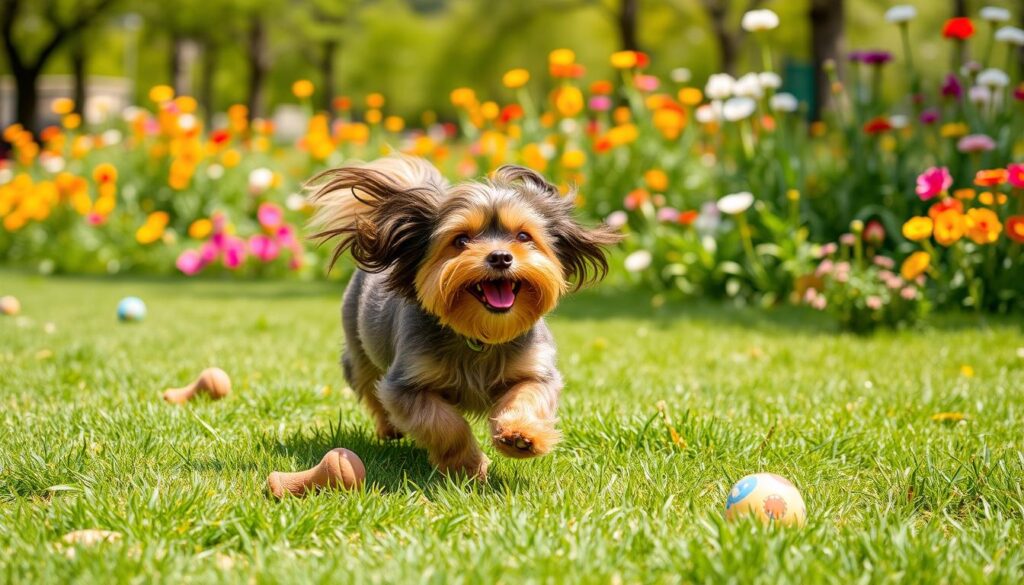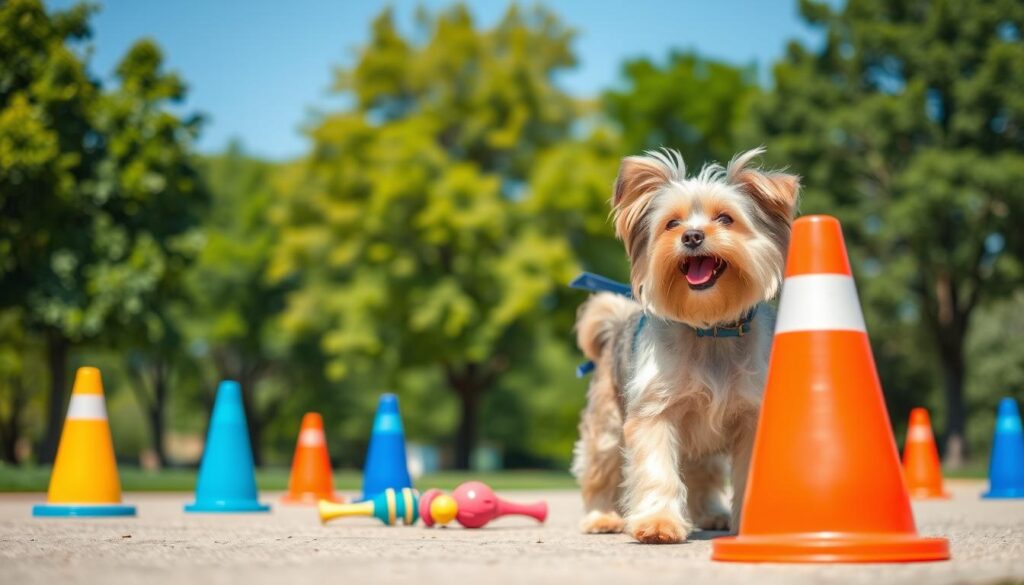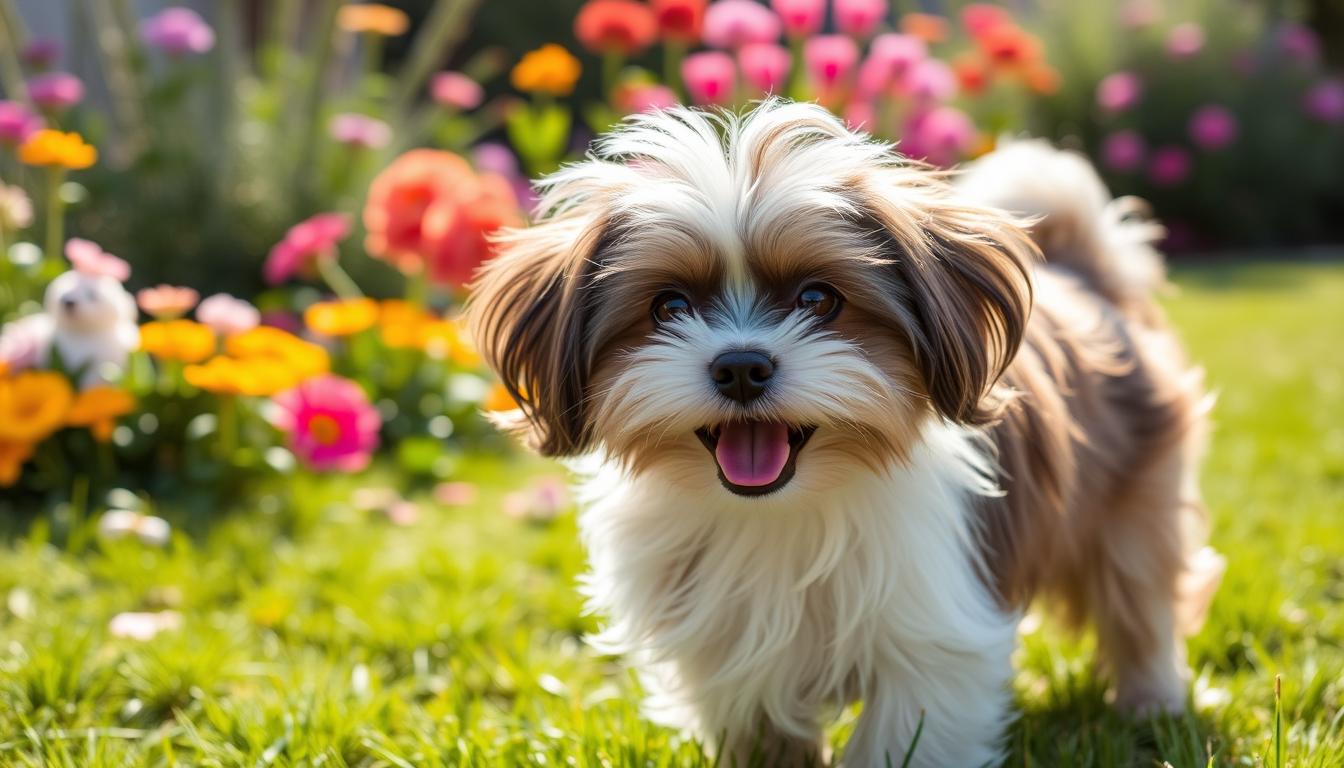Explore the world of Havanese dogs, a breed loved by many. They are small, friendly, and fit well in different homes. If you’re thinking of getting a Havanese or just want to learn more, this guide has everything you need to know.
Key Takeaways
- The Havanese is a small, hypoallergenic dog breed that originated in Cuba.
- They are affectionate, intelligent, and excel as family companions.
- Havanese dogs require regular grooming and moderate exercise to maintain their health and wellbeing.
- These dogs are known for their adaptability and can thrive in both small and large living spaces.
- Proper training and socialization are crucial for the Havanese to develop into well-behaved, well-rounded pets.
Understanding the History and Origins of Havanese Dogs
The Havanese dog breed has a rich history tied to Cuba. It comes from the Bichon family, known for their small, fluffy coats. These dogs were favorites of European aristocrats.
Cuban Heritage and Royal Connections
Spanish settlers brought the Havanese’s ancestors to Cuba in the 16th century. They became pets of the island’s elite. These dogs were seen as symbols of wealth and status.
The breed’s royal connections are well-documented. They were favored by Spanish and Cuban royalty. These dogs were loved for their lively nature and unique looks.
Development of the Modern Breed Standard
In the 20th century, the Havanese faced extinction threats in Cuba. But, a group of enthusiasts saved the breed. In the 1970s, the American Kennel Club (AKC) recognized the Havanese.
Today, the Havanese is a cherished member of the Bichon family. It’s known for being friendly, intelligent, and affectionate. The breed’s standard has been refined to preserve its unique qualities.
Physical Characteristics and Appearance
Havanese dogs are known for their unique looks. They are small, standing 8.5 to 11.5 inches tall and weighing 7 to 13 pounds. Their silky coat comes in many coat colors, from white to black, with patterns like brindle and sable.
Their expressive eyes are large and dark, showing intelligence and love. Their long, flowing coat frames their face, making them look adorable.
Havanese dogs have a sturdy, compact body. They have a curled tail and a double-layered coat that’s soft and lightweight. This makes them agile and energetic, yet gentle and loving.
| Characteristic | Description |
|---|---|
| Havanese Size | 8.5 to 11.5 inches tall, 7 to 13 pounds |
| Coat Colors | White, black, brindle, sable, parti-color, and more |
| Coat Type | Silky, double-layered, and lightweight |
| Facial Features | Large, expressive eyes, long, flowing coat framing the face |
The Havanese breed is a true charmer. Their size, coat, and facial features make them stand out. They are a unique and adorable companion.
Havanese Dogs: Temperament and Personality Traits
Havanese dogs are known for being friendly and sociable. They make great family pets. These smart dogs can live in many places, from small apartments to big houses. They are easy to train and always happy to please.
Social Nature and Family Compatibility
Havanese dogs love their families a lot. They are very affectionate and loyal. They enjoy being around people and making friends.
They are perfect for families with kids. They are patient and gentle. They love to play and have fun with everyone.
Intelligence and Training Capacity
Havanese dogs are very smart. They learn quickly and enjoy learning new things. They are easy to train and can do many fun activities.
They can do agility, obedience, and even help people as therapy dogs. Their intelligence makes them great at many things.
Behavior with Children and Other Pets
Havanese dogs are very friendly with kids and other pets. They are patient and gentle. They make great friends for children.
With the right introduction, they get along well with other animals. They are adaptable and love to please. They are perfect for families with other pets.
| Personality Trait | Description |
|---|---|
| Friendly | Havanese dogs are outgoing and affectionate, forming strong bonds with their human families. |
| Intelligent | These breeds are quick learners and excel at various canine activities, such as obedience and agility. |
| Sociable | Havanese thrive in multi-person households and enjoy interacting with children and other pets. |
| Adaptable | Havanese dogs can adapt to a variety of living situations, from apartments to larger homes. |
Health Care Requirements and Common Medical Issues
As a Havanese dog owner, knowing about the breed’s health is key. Havanese dogs are generally healthy and live long lives. But, they can face certain health issues that need care and prevention.
Havanese health problems include patellar luxation, where the kneecap slips out of place. Regular vet visits and early treatment can help. They also face progressive retinal atrophy, a condition that can cause vision loss if not caught and treated early.
| Common Havanese Health Concerns | Recommended Preventative Care |
|---|---|
| Patellar luxation | Regular veterinary check-ups and early treatment |
| Progressive retinal atrophy | Routine eye examinations and genetic testing |
| Dental disease | Dental cleanings, tooth brushing, and appropriate dental chews |
| Skin allergies and sensitivities | Hypoallergenic diet, medicated shampoos, and environmental management |
To keep your Havanese healthy, follow a preventative care plan. This includes regular vet visits, early treatment of genetic disorders, and a balanced diet. With the right care, Havanese can live 12 to 15 years, staying healthy and happy.
https://www.youtube.com/watch?v=DMt-2e07wko
Grooming Needs and Maintenance
Keeping your Havanese dog healthy and looking good is key. Their long, silky coat needs a lot of care. This ensures it stays in top shape.
Coat Care and Brushing Techniques
Brushing your Havanese regularly is crucial. It keeps their coat tangle-free and shiny. Brush at least three times a week with a slicker brush and metal comb.
Begin at the bottom and work up. Be gentle to avoid pulling on their hair.
Bathing Schedule and Products
Bath your Havanese every four to six weeks. Use a mild, sulfate-free shampoo for long coats. Don’t over-bathe, as it can harm their skin and coat.
After bathing, dry their coat well. This prevents dampness and bad smells.
Professional vs. Home Grooming Options
Home grooming is vital, but sometimes a pro is better. Professional groomers can safely trim and clean your dog. They also keep them looking great.
If you’re up for it, you can bathe and groom your dog at home. This can save money on grooming costs.
| Home Grooming | Professional Grooming |
|---|---|
|
|
Exercise Requirements and Activity Levels
Havanese dogs are full of energy and need lots of physical and mental play. They must get regular exercise to stay happy and healthy. Without enough activity, they might get into trouble.
To keep your Havanese happy, aim for 30-60 minutes of playtime each day. You can split this into several sessions. Mix indoor and outdoor fun, like:
- Playtime with interactive toys and puzzle feeders to engage their minds
- Brisk walks around the neighborhood or trips to the local dog park
- Gentle exercise routines like short jogs or training sessions
- Interactive games like fetch, tug-of-war, or hide-and-seek
Havanese dogs love places where they can play and think. Indoor games and training are great when it’s too cold or rainy outside.
| Activity | Duration | Frequency |
|---|---|---|
| Brisk walks | 20-30 minutes | Once or twice daily |
| Fetch or tug-of-war | 10-15 minutes | Multiple times per day |
| Puzzle toys/training | 15-20 minutes | Daily |
With a good mix of exercise, your Havanese will stay fit, smart, and social. This is key for their happiness and health.

Diet and Nutrition Guidelines
Proper nutrition is key for your Havanese dog’s health and happiness. It’s vital to know their dietary needs and feeding schedule. Let’s explore Havanese dog nutrition in detail.
Feeding Schedule and Portion Control
Havanese dogs do well with two meals a day, each with 1/2 to 1 cup of high-quality dog food. The exact amount depends on their age, activity level, and health. It’s important to watch their weight and adjust food portions to avoid over or underfeeding.
Special Dietary Considerations
Havanese dogs usually tolerate different dog foods well. However, they might gain weight easily. So, choose a dog food that fits their size and activity level. Some Havanese may also have sensitivities to certain ingredients. Always talk to your vet to find the best diet for your Havanese.
| Nutrient | Recommended Daily Intake |
|---|---|
| Protein | 18-25% of total diet |
| Fat | 8-15% of total diet |
| Carbohydrates | 30-50% of total diet |
| Fiber | 2-4% of total diet |
By following these Havanese diet and dog nutrition guidelines, you can ensure your furry friend gets the balanced and dietary needs they require to thrive.
Training Tips and Socialization Strategies
Effective Havanese training is key to raising a well-behaved and socialized pup. Use positive reinforcement to reward good behavior and gently correct bad ones. This approach helps your Havanese become a well-adjusted member of your family.
Begin Havanese training early, as these dogs are smart and love to learn. Make sure to socialize your Havanese with people, animals, and different places. This helps them feel confident and prevents future problems.
For obedience training, start with basic commands like sit, stay, and come. Use treats, praise, and play to encourage good behavior. Remember, Havanese can be stubborn, so be patient and consistent.
- Establish a regular training routine and stick to it.
- Use positive reinforcement to encourage desired behaviors.
- Introduce new stimuli gradually during dog socialization sessions.
- Be patient and consistent throughout the Havanese training process.
By following these Havanese training and dog socialization tips, you’ll have a happy, obedient, and confident Havanese. They will bring joy to your family for years to come.

Conclusion
The Havanese dog is a remarkable breed. They are loyal, intelligent, and full of love. These small, energetic dogs are great for families and fit well in apartments.
If you’re thinking about getting a Havanese, you’re in for a treat. They are gentle, easy to train, and adapt well to different homes. They are the perfect family pet for many families.
When looking into small dog adoption, consider the Havanese. They look great, but they’re also resilient and versatile. Their love for their owners makes them a wonderful choice for a pet.

